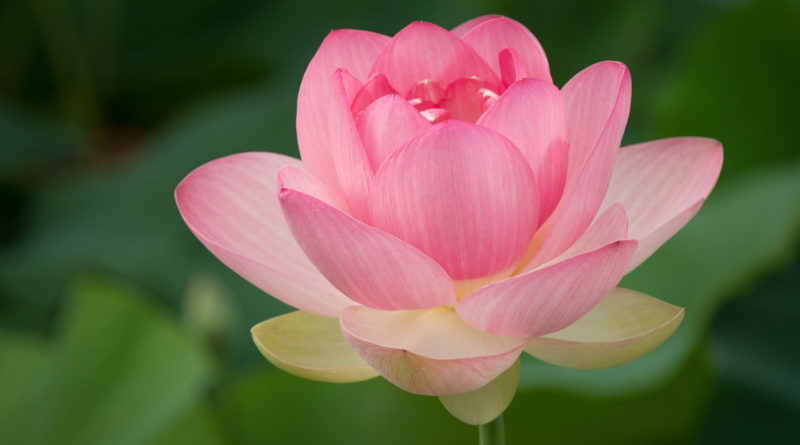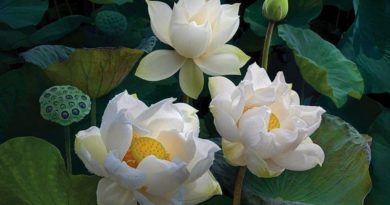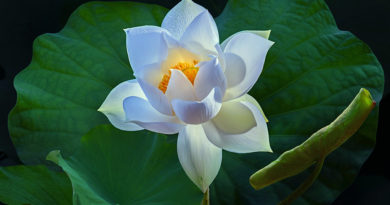Division Iii –– Khandhaka Book 21 –– Khandha Saṃyutta Section 2 –– The Middle Fifty Chapter 5 –– Puppha (pañcamo) Vagga
Sutta Pitaka
Saṃyutta Nikāya
Division III –– Khandhaka
Book 21 –– Khandha Saṃyutta
Section 2 –– The Middle Fifty
Chapter 5 –– Puppha (Pañcamo) Vagga
Namo tassa bhagavato arahato sammā sambuddhassa
21. 2. 5. 1.
(93) Nadī –– The River
1. I heard thus. At one time the Blessed One lived in the monastery offered by Anāthapiṇḍika in Jeta’s grove in Sāvatthi.
2. From there, the Blessed One addressed the monks.
3. “Monks, like the river dragging itself down the mountains goes far and has a quick current, would fall along even the reeds, the coarse grass, the fragrant grass and even the trees on the two banks
4. “A man taken along by that current would take hold of the reeds, they would break and he would come to great destruction. He would take hold of the coarse grass, it would break and he would come to great destruction. He would take hold of the fragrant grass, they would break and he would come to great destruction. Or he would take hold of the trees, they would break and he would come to great destruction.
5. “In the same manner monks, the not learned ordinary man who has not seen noble ones, or heard their Teaching, not trained and not clever in their Teaching, has not seen Great Beings, or heard their Teaching, not trained and not clever in their Teaching, reflects matter from self, or a material self, or in self matter, or in matter self. That matter crumbles and on account of that, he comes to great destruction.
6-8. “The not learned ordinary man reflects feelings, perceptions, intentions from self, or an intending self, or in self intentions, or in intentions self. Those intentions crumble and on account of that, he comes to great destruction.
9. “He reflects consciousness from self, or a conscious self, or in self consciousness, or in consciousness self. That consciousness crumbles and on account of that, he comes to great destruction.
10. “Monks, is matter permanent or impermanent?”
“Venerable sir, it is impermanent.”
“That which is impermanent, is it unpleasant or pleasant?”
“Venerable sir, it is unpleasant.”
“That which is impermanent, unpleasant, changing is it suitable to be reflected, ‘It is mine, I am that, it is my self’?”
“That is not so, venerable sir”
11-14. “Are feelings, perceptions, intentions, and consciousness, permanent or impermanent?”
“Venerable sir, they are impermanent.”
“Those which are impermanent are they unpleasant or pleasant?”
“Venerable sir, they are unpleasant.”
“Those which are impermanent, unpleasant changing are they suitable to be reflected, they are mine, I am there or they are my self?”
“That is not so, venerable sir.”
15. “Therefore monks, whatever matter, feelings, perceptions, intentions, or consciousness in the past, future or at present, seized or not, rough or fine, unexalted or exalted, far or near, are not mine, I am not that, they are not my self.
16. “Monks, the learned noble disciple seeing it thus turns from matter, turns from feelings, turns from perceptions, turns from intentions and turns from consciousness. Turning looses interest. Loosing interest is released and knowledge arises I am released. He knows, ‘Birth is destroyed, the holy life is lived to the end, duties are done, and I have nothing more to wish.’”
21. 2. 5. 2.
(94) Puppaṃ or Vaddhaṃ –– The Flower
1. I heard thus. At one time the Blessed One lived in the monastery offered by Anāthapiṇḍika in Jeta’s grove in Sāvatthi.
2. From there the Blessed One addressed the monks.
3. “Monks, I do not dispute with the world. The world disputes with me. Monks saying it properly, there is no dispute with the world on account of anything.
4. “If it is, there is no righteous wisdom in the world, I too say, it is so. If it is, there is righteous wisdom in the world, I too say, it is so.
5. “Monks, how is there no righteous wisdom in the world, which I too say, is so?
6. “Monks, there is no righteous wisdom in the world, as matter is permanent, stable, stands forever and does not change. I too say, it is so.
7-9. Monks, there is no righteous wisdom in the world, as feelings, perceptions, intentions are permanent, stable, stands forever and do not change. I too say, it is so.
10. “Monks, there is no righteous wisdom in the world, as consciousness is permanent, stable, stands forever and does not change. I too say, it is so.
11. “Monks, thus there is no righteous wisdom in the world, which I too say, is so.
12. “Monks, how is there righteous wisdom in the world, which I too say, is so?
13. “Monks, there is righteous wisdom in the world, as matter is impermanent, unstable, does not stand forever without a change. I too say, it is so.
14-16. Monks, there is righteous wisdom in the world, as feelings, perceptions, intentions are impermanent, unstable, not everlasting, changes. I too say, it is so.
17. “Monks, there is righteous wisdom in the world, as consciousness is impermanent, unstable, does not stand forever without change. I too say, it is so.
18. “Monks, thus there is righteous wisdom in the world, which I too say, is so.
19. “Monks, these are worldly conditions which the Thus Gone One realizing and thoroughly understanding, tells, preaches, makes known, establishes, explaining makes threadbare, and opens up.
20. “Monks, what are the worldly conditions which the Thus Gone One realizing and thoroughly understanding, tell, preach, make known, establish, explaining make threadbare and open?
21. “Monks, this worldly condition of matter, the Thus Gone One realizing and thoroughly understanding, tells, preaches, makes known, establishes, explaining makes threadbare, and opens up. When this is done the ordinary, foolish man does not have insight does not know it and see it, so what shall I do about it?
22. “Monks, this worldly condition of feelings, the Thus Gone One realizing and thoroughly understanding, tells, preaches, makes known, establishes, explaining makes threadbare, and opens up. When this is done the ordinary, foolish man does not have insight does not know it and see it, so what shall I do about it?
23. “Monks, this worldly condition of perceptions, the Thus Gone One realizing and thoroughly understanding, tells, preaches, makes known, establishes, explaining makes threadbare, and opens up. When this is done the ordinary, foolish man does not have insight does not know it and see it, so what shall I do about it?
24. “Monks, this worldly condition of intentions, the Thus Gone One realizing and thoroughly understanding, tells, preaches, makes known, establishes, explaining makes threadbare, and opens up. When this is done the ordinary, foolish man does not have insight does not know it and see it, so what shall I do about it?
25. “Monks, this worldly condition of consciousness, the Thus Gone One realizing and thoroughly understanding, tells, preaches, makes known, establishes, explaining makes threadbare, and opens up. When this is done the ordinary, foolish man does not have insight does not know it and see it, so what shall I do about it?
26. “Monks, the blue, red, or white lotus, born and nourished in the water, rises beyond the water and stands unsoiled by the water.
27. “Monks in the same manner the Thus Gone One nourished in the world stands above it, not soiled by the world.”
21. 2. 5. 3.
(95) Phenaṃ –– Foam
1. At one time the Blessed One lived in Ayojjhā on the bank of river Ganges;
2. From there the Blessed One addressed the monks:
3. “Monks, river Ganges bears with it a large lump of foam and a wise man seeing it, penetrates and wisely concludes that it’s without essence. Monks, what essence is there in a lump of foam?
4. “In the same manner monks, whatever matter in the past, future or at present, seized or not, rough or fine, unexalted or exalted, far or near, the monk wisely concludes it’s without essence. Monks, what essence do you see, in matter?
5. “Monks, in the Autumn, it rains in large drops and water bubbles rise and fade. A wise man seeing it penetrates and wisely concludes it’s without essence. Monks, what essence do you see in a water bubble?
6. “In the same manner monks, whatever feelings in the past, future or at present, seized or not, rough or fine, unexalted or exalted, far or near, the monk wisely concludes it’s without essence. Monks, what essence do you see, in feelings?
7. “Monks, in the last months of the Summer there is an illusion of water. A wise man seeing it penetrates and wisely concludes that it’s without essence. Monks, what essence do you see in an illusion of water?
8. “In the same manner monks, whatever perceptions in the past, future or at present, seized or not, rough or fine, unexalted or exalted, far or near, a wise man examines and wisely concludes that it’s without essence. Monks, what essence do you see in perceptions?
9. “Monks, a man in need of heartwood, enters the forest with a sharp axe, seeing a huge, straight young plantain tree he cuts at the root and the top. Then he breaks open the sheaves in the trunk and does not come to even the soft wood, he does not get any heartwood.
10. “Then a wise man examines and wisely concludes that it’s without essence. Monks, what essence do you see, in a plantain trunk?
11. “In the same manner monks, whatever intentions in the past, future or at present, seized or not, rough or fine, unexalted or exalted, far or near, a wise man examines and wisely concludes that it’s without essence. Monks, what essence do you see, in intentions?
12. “Monks, a magician or his apprentice exhibits his magic on the crossroads. A wise man seeing it penetrates and wisely concludes that it’s without essence. Monks, what essence do you see in magic?
13. “In the same manner monks, whatever consciousness in the past, future or at present, seized or not, far or near, rough or fine, unexalted or exalted a wise man examines and wisely concludes that it’s without essence. Monks, what essence do you see, in consciousness?
14. “Monks, the learned noble disciple seeing it thus turns from matter, feelings, perceptions, intentions, and consciousness. Turning looses interest. Without interest he is released and knows, ‘I am released, the holy life is lived to the end, duties are done, I have nothing more to wish’.”
The two-footed relation of the sun said:
1. “Matter is comparable to foam
Feelings to bubbles,
Perceptions are comparable to illusions
Intentions to plantain sheaves
And consciousness to magic,
2. In whatever way he wisely examines it,
He sees it as useless and without essence.
3. About this body, the wise one declared,
When devoid of three, matter has to be discarded.
4. When life span, name, [1] and consciousness,
Get discarded from this body,
It lies unconscious being thrown here and there
And it becomes the food of others.
5. This is how we continue,
It’s magic the foolish, prattle.
The Blessed One declared,
It’s the slayer, no essence is evident there.
6. The monk with aroused effort,
And with mindful awareness should reflect,
The masses through out the day
And through the day and night.
7. Monks discard all bonds
And procure your own refuge
Until you realize extinction,
Behave as though your head has caught fire.
(96) Gomayaṃ –– Cow dung
1. I heard thus. At one time the Blessed One lived in the monastery offered by Anāthapiṇḍika in Jeta’s grove in Sāvatthi.
2. Then a certain monk approached the Blessed One, worshipped and sat on a side.
3. Seated, that monk said to the Blessed One:
4. “Venerable sir, is there any matter that is permanent, stable, stands forever without change and destruction?
5. “Venerable sir, are there any feelings that are permanent, stable, stand forever without change and destruction?
6. “Venerable sir, are there any perceptions that are permanent, stable, stand forever without change and destruction?
7. “Venerable sir, are there any intentions that are permanent, stable, stand forever without change and destruction?
8. “Venerable sir, is there any consciousness that is permanent, stable, stand forever without change and destruction?”
9. “Monk, there is no matter that is permanent, stable, stand forever without change and destruction.
10. “Monk, there are no feelings that are permanent, stable, stand forever without change and destruction.
11. “Monk, there are no perceptions that are permanent, stable, stand forever without change and destruction.
12. “Monk, there are no intentions that are permanent, stable, stand forever without change and destruction.
13. “Monk, there is no consciousness that is permanent, stable, stand forever without change and destruction.”
14. Then the Blessed One picked a little bit of cow dung and addressed the monks:
15. “Monk, a gain of self, that is as big as this bit of cowdung, is not permanent, stable, stand forever without change and destruction.
16. “Monk, if a gain of self, that is as big as this bit of cow dung, will be permanent, stable, stand forever without change and destruction, the holy life would not have been pointed out for the rightful destruction of unpleasantness. Since a gain of self, even as big as this bit of cow dung, will not be permanent, stable, stand forever without change and destruction, the holy life is pointed out for the rightful destruction of unpleasantness.
17. “Monk, in the past there was a head anointed warrior king. It was me. I had forty thousand towns with the chief kingdom in Kusawathie.
18. “I had forty thousand palaces, the chief was the Dhamma palace.
19. “I had forty thousand gabled halls, the chief was the gabled hall for the arrangement of troops.
20. “I had forty thousand couches made, of pure elephants’ tusks, of gold, of pure gold, lined with the hide of the deer and covered on both sides with red covers.
21. “I had forty thousand elephants decorated with gold ornaments and flags, with the sacrificial royal elephant, Uposatha decorated with golden chains in the forefront.
22. “I had forty thousand horses decorated with gold ornaments and flags, with the royal horse Valahaka decorated with golden chains in the forefront.
23. “I had forty thousand chariots decorated with gold ornaments and flags, with the royal Vejayantha decorated with golden chains in the forefront.
24. “I had forty thousand gems with the royal gem in the forefront.
25. “I had forty thousand women with queen Subaddha as the chief consort.
26. “I had a following of forty thousand attendant warrior kings, with the jewel of a leader’s leading.
27. “I had forty thousand cows tethered gently to bronze pots to be milked.
28. “I had forty thousand, hundred thousand soft linen clothes silk clothes and soft blankets made of delicate cotton.
29. “I had forty thousand pots that cook rice by themselves, at dawn.
30. “At that time I lived in a single town in the kingdom of Kusawathie.
31. “At that time I lived in the Dhamma palace only.
32. “At that time I used only one gabled hall and that was the Great gabled hall for the troops.
33. “At that time I used only one couch made of pure elephant tusks, of gold, of pure gold, lined with the hide of the deer and covered on both sides with red covers.
34. “Of the forty thousand elephants at that time I rode only the royal elephant Uposatha.
35. “Of the forty thousand horses, at that time I rode only the royal horse Valahaka.
36. “Of the forty thousand chariots at that time I mounted only the royal chariot Vejanta.
37. “Of the forty thousand women only one attended on me at the time, either Khattiyani or Velamika,
38. “Of the forty thousand, hundred thousand soft linen clothes silk clothes and soft blankets made of delicate cotton, at that time I used a single set of clothes.
39. “Of the forty thousand pots that cook rice I used only one, to cook rice and the suitable soups to go with it.
40. “Thus monk all those intentions have gone by, ceased and changed.
41. “Thus monk intentions are so impermanent, unstable and not gone beyond destruction.
42. “Thus monk, it is suitable that you should turn, loose interest and be released from all intentions.”
21. 2. 5. 5.
(97) Nakasikhaṃ –– On the Nail
1. I heard thus. At one time the Blessed One lived in the monastery offered by Anāthapiṇḍika in Jeta’s grove in Sāvatthi.
2. Then a certain monk approached the Blessed One, worshipped and sat on a side.
3. Seated, that monk said to the Blessed One.
4. “Venerable sir, is there any matter that is permanent, stable, constant, and without change and destruction?
5. “Venerable sir, are there any feelings that are permanent, stable, constant, and without change and destruction?
6. “Venerable sir, are there any perceptions that are permanent, stable, constant, and without change and destruction?
7. “Venerable sir, are there any intentions that are permanent, stable, constant, and without change and destruction?
8. “Venerable sir, is there any consciousness that is permanent, stable, constant, and without change and destruction?”
9. “Monk, there is no matter that is permanent, stable, without change and destruction.
10. “Monk, there are no feelings that are permanent, stable, and without change and destruction.
11. “Monk, there are no perceptions that are permanent, stable, and without change and destruction.
12. “Monk, there are no intentions that are permanent, stable, and without change and destruction.
13. “Monk, there is no consciousness that is permanent, stable, and without change and destruction.”
14. Then the Blessed One mounted a little bit of sand on his nail and addressed the monks:
15. “Monks, matter even of this magnitude is not permanent, stable, and without change and destruction. If matter even of this magnitude will be permanent, stable, and without change and destruction, the holy life would not have been pointed out for the rightful destruction of unpleasantness. Since matter even this magnitude will not be permanent, stable, and without change and destruction, the holy life is pointed out for the rightful destruction of unpleasantness.
16. “Monk, feelings even of this magnitude is not permanent, stable, constant, and without change and destruction. If feelings even of this magnitude will be permanent, stable, and without change and destruction, the holy life would not have been pointed out for the rightful destruction of unpleasantness. Since feelings that are so small will not be permanent, stable, and without change and destruction, the holy life is pointed out for the rightful destruction of unpleasantness.
17. “Monk, perceptions even of this magnitude, are not permanent, stable, and without change and destruction. If perceptions even of this magnitude will be permanent, stable, and without change and destruction, the holy life would not have been pointed out for the rightful destruction of unpleasantness. Since perceptions that ate even of small will not be permanent, stable, and without change and destruction, the holy life is pointed out for the rightful destruction of unpleasantness.
18. “Monk, intentions even of this magnitude, are not permanent, stable, and without change and destruction. If intentions even of this magnitude will be permanent, stable, constant, and without change and destruction, the holy life would not have been pointed out, for the rightful destruction of unpleasantness. Since intentions even so small will not be permanent, stable, and without change and destruction, the holy life is pointed out for the rightful destruction of unpleasantness.
19. “Monk, consciousness even of this magnitude is not permanent, stable, and without change and destruction. If consciousness even of this magnitude will be permanent, stable, and without change and destruction, the holy life would not have been pointed out for the rightful destruction of unpleasantness. Since consciousness that is so small will not be permanent, stable, and without change and destruction, the holy life is pointed out for the rightful destruction of unpleasantness.
20. “Monk, is matter permanent or impermanent?”
“Venerable sir, it is impermanent.”
“That which is impermanent, is it unpleasant or pleasant?”
“Venerable sir, it is unpleasant.”
“Those which are impermanent, unpleasant, changing is it suitable to be reflected, ‘It is mine, I am that, it is my self’?”
“That is not so, venerable sir”
“Are feelings, perceptions, intentions, and consciousness, permanent or impermanent?”
“Venerable sir, they are impermanent.”
“Those which are impermanent, are they unpleasant or pleasant?”
“Venerable sir, they are unpleasant.”
“Those which are impermanent, unpleasant changing are they suitable to be reflected, they are mine, I am there, they are my self?”
“That is not so, venerable sir.”
21. “Therefore monk, whatever matter, feelings, perceptions, intentions, or consciousness in the past, future or at present, seized or not, rough or fine, unexalted or exalted, far or near, are not mine, I am not there, they are not my self.
22. “Monk, the learned noble disciple seeing it thus turns from matter, turns from feelings, turns from perceptions, turns from intentions and turns from consciousness. Turning looses interest. Loosing interest is released and knowledge arises I am released. He knows, ‘Birth is destroyed, the holy life is lived to the end, duties are done, and I have nothing more to wish.’”
21. 2. 5. 6.
(98) Sudiṭṭhaṃ –– Thoroughly Realized
1. I heard thus. At one time the Blessed One lived in the monastery offered by Anāthapiṇḍika in Jeta’s grove in Sāvatthi.
2. Then a certain monk approached the Blessed One, worshipped and sat on a side.
3. Seated, that monk said to the Blessed One.
4. “Venerable sir, is there any matter that is permanent, stable, and without change and destruction?
5. “Venerable sir, are there any feelings that are permanent, stable, and without change and destruction?
6. “Venerable sir, are there any perceptions that are permanent, stable, and without change and destruction?
7. “Venerable sir, are there any intentions that are permanent, stable, and without change and destruction?
8. “Venerable sir, is there any consciousness that is permanent, stable, and without change and destruction?”
9. “Monk, there is no matter that is permanent, stable, constant, without change and destruction.
10. “Monk, there are no feelings that are permanent, stable, constant, and without change and destruction.
11. “Monk, there are no perceptions that are permanent, stable, constant, and without change and destruction.
12. “Monk, there are no intentions that are permanent, stable, and without change and destruction.
13. “Monk, there is no consciousness that is permanent, stable, and without change and destruction.”
21. 2. 5. 7.
(99) Gaddula or Bhaddula I –– The Leather Strap I
1. I heard thus. At one time the Blessed One lived in the monastery offered by Anāthapiṇḍika in Jeta’s grove in Sāvatthi.
2. Then the monks approached the Blessed One, worshipped and sat on a side and the Blessed One said:
3. “Monks, there is no end and no beginning to beings, enclosed in ignorance and bound by craving, running from one existence to another.
4. “Monks, there is a time when the great ocean dries up, disappears and becomes not evident, yet I do not declare the ending of unpleasantness to beings, enclosed in ignorance and bound by craving, running from one existence to another.
5. “Monks, there is a time when huge Mount Sineru gets burnt, disappears, and becomes not evident, yet I do not declare the ending of unpleasantness to beings, enclosed in ignorance and bound by craving, running from one existence to another.
6. “Monks, there is a time when the great earth gets burnt up, disappears, and becomes not evident, yet I do not declare the ending of unpleasantness to beings, enclosed in ignorance and bound by craving, running from one existence to another.
7. “Monks, like one bound, or closely strapped to an iron pole or some post with a leather strap would turn, round and round the iron pole or post. In the same manner the not learned ordinary man who has not seen noble ones, or heard their Teaching, not trained and not clever in their Teaching, has not seen Great Beings, or heard their Teaching, not trained and not clever in their Teaching, reflects matter from self, or a material self, or in self matter, or in matter self. Reflects feelings from self, or a feeling self, or in self feelings, or in feelings self. Reflects perceptions from self, or a perceiving self, or in self perceptions or in perceptions self. Reflects intentions in self, or an intending self, or in self intentions, or in intentions self. Reflects consciousness from self, or a conscious self, or in self consciousness, or in consciousness self. He dabbles with matter, dabbles with feelings, dabbles with perceptions, dabbles with intentions, and dabbles with consciousness. Dabbling with matter he is not released from matter. Dabbling with feelings he is not released from feelings. Dabbling with perceptions he is not released from perceptions. Dabbling with intentions he is not released from intentions and dabbling with consciousness, he is not released from consciousness. Not released from consciousness he is not released from birth, decay, death, grief, lament, wailing, unpleasantness, displeasure, and distress. I say he is not released from unpleasantness.
8. “As for the learned noble disciple who has seen noble ones, has heard their Teaching, trained and clever in their Teaching, has seen Great Beings, had heard their Teaching, trained and clever in their Teaching, does not reflect matter from self, or a material self, or in self matter, or in matter self. Does not reflect feelings from self, or a feeling self, or in self feelings, or in feelings self. Does not reflect perceptions from self, or a perceiving self, or in self perceptions or in perceptions self. Does not reflect intentions in self, or an intending self, or in self intentions, or in intentions self. Does not reflect consciousness from self, or is conscious self, or in self consciousness, or in consciousness self. He does not dabble with matter, dabble with feelings, dabble with perceptions, dabble with intentions and does not dabble with consciousness. Not dabbling with matter he is released from matter. Not dabbling with feelings he is released from feelings. Not dabbling with perceptions he is released from perceptions. Not dabbling with intentions he is released from intentions and not dabbling with consciousness he is released from consciousness. Released from consciousness he is released from birth, decay, death, grief, lament, wailing, unpleasantness, displeasure, and distress. I say he is released from unpleasantness.”
21. 2. 5. 8.
(100) Gaddula II –– The Leather Strap II
1. I heard thus. At one time the Blessed One lived in the monastery offered by Anāthapiṇḍika in Jeta’s grove in Sāvatthi.
2. Then the monks approached the Blessed One, worshipped and sat on a side and the Blessed One said:
3. “Monks, there is no end and no beginning to beings, enclosed in ignorance and bound by craving, running from one existence to another.
4. “Monks, like one bound, or closely strapped to an iron pole or post with a leather strap, going would go close to the iron pole or post, standing would stand close to the iron pole or post, sitting would sit close to it, lying would lie close to it.
5. “In the same manner the not learned ordinary man reflects, “Matter is mine, I am matter, it is my self; feelings are mine, I am feelings, they are my self; perceptions are mine, I am perceptions, they are my self; intentions are mine, I am intentions, they are my self; consciousness is mine, I am consciousness, it is my self.’ Going he goes to the five holding masses, standing, stands on them, sitting, sits on the five holding masses, and lying, lies on the five holding masses.
6. “Therefore, monks, examining internally you should reflect, since long this mind was defiled by greed, hate and delusion. Monks, the defiled mind defiles beings, and the pure mind purifies beings.
7. “Monks, do you see? Behavior, is the present mental condition?”
“Yes, venerable sir, we do.”
“Monks, behavior is what was thought and active thinking is the procedure of mind.
8. “Therefore, monks, examining internally you should reflect, since long this mind was defiled by greed, hate and delusion. Monks, the defiled mind defiles beings, and the pure mind purifies beings.
9. “Monks, I do not see any other thing that is kept to oneself as the behavior of mind. Even these four footed living things behave as they think and it’s a series of actions to them.
10. “Therefore, monks, examining internally you should reflect, since long this mind was defiled by greed, hate and delusion. Monks, the defiled mind defiles beings, and the pure mind purifies beings.
11. “Monks, a painter drawing pictures with white, red, orange paint or lacquer on a smooth surface, a wall or a fine cloth would create the image of a woman or man with all limbs and details, in the same manner the not learned ordinary man, creating creates with matter, creating creates with feelings, creating creates with perceptions, creating creates with intentions and creating creates with consciousness.
12. “Monks, is matter permanent or impermanent?”
“Venerable sir, it is impermanent.”
“That which is impermanent, is it unpleasant or pleasant?”
“Venerable sir, it is unpleasant.”
“That which is impermanent, unpleasant and a changing thing, is it suitable to be reflected, ‘It is mine, I am that, it is my self’?”
“That is not so, venerable sir”
13. “Are feelings, perceptions, intentions or consciousness, permanent or impermanent?”
“Venerable sir, they are impermanent.”
“Those which are impermanent, are they unpleasant or pleasant?”
“Venerable sir, they are unpleasant.”
“Those which are impermanent, unpleasant, changing are they suitable to be reflected, they are mine, I am there they are my self?”
“That is not so, venerable sir.”
14. “Therefore monks, whatever matter, feelings, perceptions, intentions, or consciousness in the past, future or at present, seized or not, rough or fine, unexalted or exalted, far or near, is not mine, I am not that, it is not my self. Monks, the learned noble disciple seeing it thus turns from matter, turns from feelings, turns from perceptions, turns from intentions and turns from consciousness. Turning looses interest. Loosing interest is released, and knowledge arises, ‘I am released.’ He knows, ‘Birth is destroyed, the holy life is lived to the end, duties are done, and I have nothing more to wish.’”
21. 2. 5. 9.
(101) Vāsijaṭā –– Handle of the Mason’s Adze
1. I heard thus. At one time the Blessed One lived in the monastery offered by Anāthapiṇḍika in Jeta’s grove in Sāvatthi.
2. Then the monks approached the Blessed One, worshipped and sat on a side and the Blessed One said:
3. “Monks, I declare the destruction of desires knowing and seeing, not without knowing and seeing.
4. “Monks, knowing and seeing what, is the destruction of desires? This is matter, this, its rising and this, its fading. These are feelings, this, their rising and this, their fading. These are perceptions, this, their rising and this, their fading. These are intentions, this, their rising and this, their fading. This is consciousness, this, its rising and this, its fading.
5. “Monks, to the monk dwelling not yoked to the development of his mind, the wish may arise several times, ‘May my mind be released from desires without holding.’ Yet his mind does not find release without holding.
6. “What is the reason? His mind is not developed, is the reply. Not developed in what? Not developed in the four ways of establishing mindfulness, the four right endeavors, the four ways of making determinations, the five mental faculties, the five powers, the seven enlightenment factors, and the eight-factored path of the noble ones.
7. “The hen sitting on the eggs for eight, ten, or twelve days, is not satisfactory and enough for the eggs to hatch.
8. “The wish may arise to the hen, ‘May the chicken break open the shell with the nails of their feet or their beaks and be born safely.’ Yet it is not possible for the chicken to break open the shell with the nails of their feet or their beaks and be born safely.
9. “What is the reason? The hen sitting on the eggs for eight, ten, or twelve days, is not satisfactory and enough for the eggs to hatch.
10. “Monks, in the same way, to the monk dwelling unyoked to the development of his mind, the wish may arise several times, ‘May my mind be released from desires without holding.’ Yet his mind does not find release without holding.
11. “What is the reason? His mind is not developed, is the reply. Not developed in what? Not developed in the four ways of establishing mindfulness, the four right endeavors, the four ways of making determinations, the five mental faculties, the five powers, the seven enlightenment factors. and the eight-factored path of the noble ones.
12. “Monks, to the monk dwelling yoked to the development of his mind, the wish may not even arise ‘May my mind be released from desires without holding.’ Yet his mind finds release without holding.
13. “What is the reason? His mind is developed, is the reply. Developed in what? The mind is developed in the four ways of establishing mindfulness, the four right endeavors, the four ways of making determinations, the five mental faculties, the five powers, the seven enlightenment factors, and the eight-factored path of the noble ones.
14. “Like the hen sittig on the eggs for eight, ten, or twelve days is satisfactory and enough for the eggs to hatch. The wish may not even arise to the hen, ‘May the chicken break open the shell with the nails of their feet or their beaks and be born safely.’ Yet it is possible for the chicken to break open the shell with the nails of their feet or their beaks and be born safely.
15. “What is the reason? The hen sitting on the eggs for eight, ten, or twelve days, is satisfactory and enough for the eggs to hatch.
16. “Monks, in the same way, to the monk dwelling yoked to the development of his mind, the wish may not even arise several times, ‘May my mind be released from desires without holding.’ Yet his mind finds release without holding.
17. “What is the reason? His mind is developed is the reply. The mind is developed in what? It is developed in the four ways of establishing mindfulness, the four right endeavors, the four ways of making determinations, the five mental faculties, the five powers, the seven enlightenment factors, and the eight-factored path of the noble ones.
18. “Monks, to the mason or his apprentice, the marks of the fingers and the mark of the hand becomes apparent on the handle of the adze. Yet he does not know, ‘This much of the handle has got wasted today, or tomorrow it is this much,’ but he knows that the handle has got wasted.
19. “In the same manner monks to the monk dwelling yoked to the development of the mind, even if knowledge does not arise, ‘Today this much of the desires have got destroyed and tomorrow it is this much,’ he knows that desires have got destroyed.
20. “Monks, to stop quickly the decay of the bindings of ropes and twigs of an ocean-going ship, close to earth and water, subjected to heat and air, in Winter is raised above the water.
21. “Monks, in the same manner the bonds of a monk yoked to the development of the mind quickly get destroyed and decayed.
21. 2. 5. 10.
(102) Aniccasaññā –– The Perception of Impermanence
1. I heard thus. At one time the Blessed One lived in the monastery offered by Anāthapiṇḍika in Jeta’s grove in Sāvatthi.
2. Then the monks approached the Blessed One, worshipped and sat on a side and the Blessed One said:
3. “Monks, of the monk developing and making much the perception of impermanence, all sensual greed, all material greed, the greed ‘to be’, all ignorance and the measuring ‘I am’, get destroyed altogether.
4. “In the Autumn the farmer ploughs his field, cutting and tearing all the roots with a huge plough. In the same manner the monk, developing the perception of impermanence, destroys all sensual greed, all material greed, the greed ‘to be’, all ignorance and the measuring ‘I am’,
5. “Just as the reapers would reap the reeds, and holding the top of the reeds would shake off the seeds, in the same manner the monk, developing the perception of impermanence, destroys all sensual greed, all material greed, the greed ‘to be’, all ignorance and the measuring ‘I am’.
6. “Just as when the stem of a bunch of mangoes is broken, all the mangoes in the bunch get dismantled, in the same manner the monk, developing the perception of impermanence, destroys all sensual greed, all material greed, the greed ‘to be’, all ignorance and the measuring ‘I am’.
7. “Just as all the rafters meet at the ridgepole, supporting the framework of a gabled roof, and it is said to be the chief beam, in the same manner the monk, developing the perception of impermanence, destroys all sensual greed, all material greed, the greed ‘to be’, all ignorance and the measuring ‘I am’.
8. “Just as of all scents of roots the kālānusari (a kind of fragrant sandalwood) is said to be the chief, in the same manner the monk, developing the perception of impermanence, destroys all sensual greed, all material greed, the greed ‘to be’, all ignorance and the measuring ‘I am’.
9. “Just as of all scents of heartwood of the lohkitacandanaṃ (a kind of red sandalwood) is said to be the chief. In the same manner the monk, developing the perception of impermanence … re … and the measuring ‘I am’.
10. “Just as of all scents of flowers the vassikaṃ (a kind of fragrant flower) is said to be the chief. In the same manner the monk, developing the perception of impermanence … re … and the measuring ‘I am’.
11. “Just as all subordinate kings are junior to the Universal Monarch and the Universal Monarch is said to be the chief, in the same manner the monk, developing the perception of impermanence … re … and the measuring ‘I am’.
12. “Monks, just as the radiance of the stars is not even one-fourth the radiance of the moon, not even one-sixteenth portion, in the same manner the monk, developing the perception of impermanence, . . re … and the measuring ‘I am’.
13. “Monks in the Autumn when the sky is clear, is free from clouds, the sun having ascended in the sky, has dispelled all darkness and burns and shines, in the same manner the monk, developing the perception of impermanence, destroys all sensual greed, all material greed, the greed ‘to be’, all ignorance, and the measuring ‘I am’.
14. “Monks, developing and making much the perception of impermanence, in which manner do all sensual greed, all material greed, the greed ‘to be’, all ignorance and the measuring ‘I am’, get destroyed altogether?
15. “‘This is matter, this, its rising and this, its fading. These are feelings, this, their rising and this, their fading. These are perceptions, this, their rising and this, their fading. These are intentions, this, their rising and this, their fading. This is consciousness, this, its rising and this, its fading.’
16. “Monks, developing and making much the perception of impermanence, in this manner all sensual greed, all material greed, the greed ‘to be’, all ignorance and the measuring ‘I am’, get destroyed altogether.”
——————–
Notes
1. Nāma –– name. This word denotes all the mental conditions and this Pali word ‘nāma’ stands for these mental conditions in Pali, saññā, vedanā, phassa, cetanā, and manasikāra. They are perceptions, feelings, intentions, contact, and attention. [Go back]







